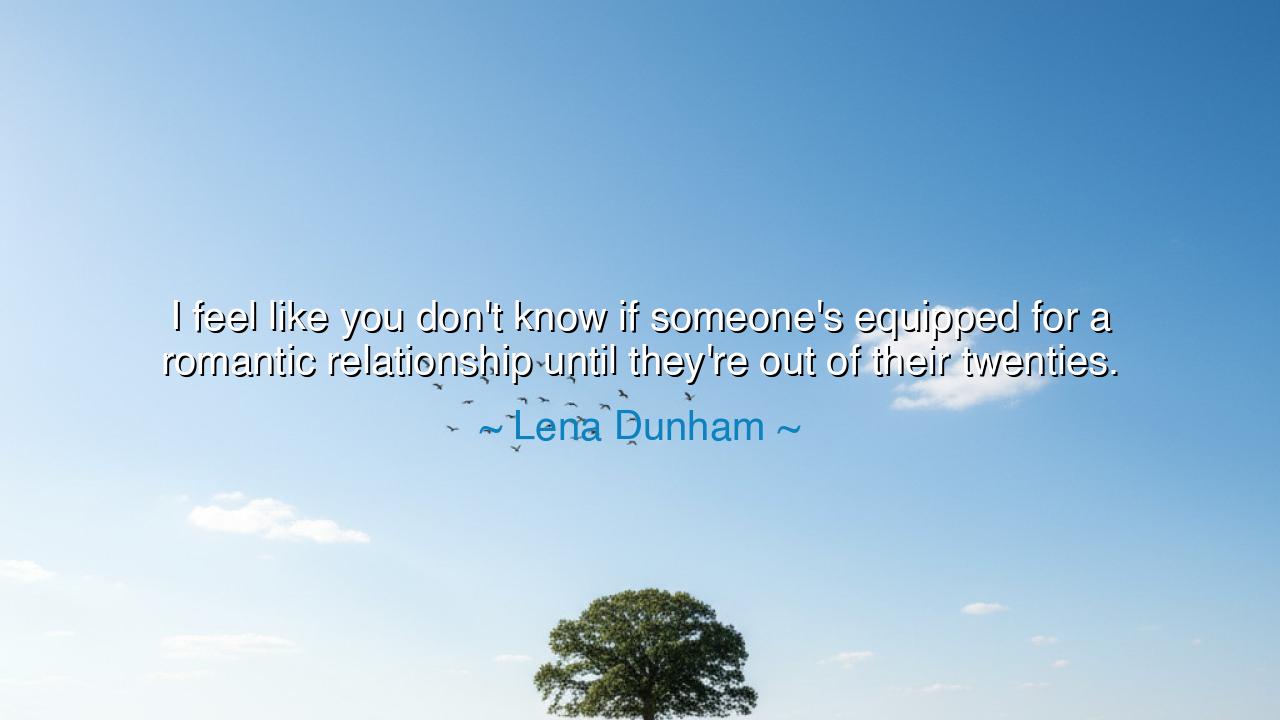
I feel like you don't know if someone's equipped for a romantic
I feel like you don't know if someone's equipped for a romantic relationship until they're out of their twenties.






In the words of Lena Dunham, a voice of modern candor and fearless reflection, we hear a wisdom that strikes at the rhythm of time itself: “I feel like you don’t know if someone’s equipped for a romantic relationship until they’re out of their twenties.” These words may sound plain, yet they carry the weight of generations, for they speak of the long road from immaturity to depth, from passion’s turbulence to love’s true steadiness.
The ancients knew that youth, though filled with fire, is not always ready for the burden of lasting union. They wrote of Achilles, whose passions burned brightly but briefly, leading him into glory and into ruin before wisdom could ripen in him. They told of lovers who, in the flush of youth, mistook desire for devotion, and recklessness for romance. Dunham’s words echo this ancient truth: that in one’s twenties, the self is still being forged, and only when the fire cools into strength does the soul stand ready for true companionship.
To be equipped for a romantic relationship is not merely to feel love, but to carry it. It is to balance passion with patience, affection with responsibility, longing with loyalty. These are not easily learned in the fleeting years of youth, when the world is still being discovered, when ambition pulls in one direction and insecurity pulls in another. Only with time, with failures endured and lessons absorbed, does the heart learn how to stand steady beside another.
History bears witness. Think of Queen Victoria and Prince Albert. Though they married young, their relationship ripened only with time and responsibility. In their early years, quarrels arose, fueled by ego and inexperience. But as they grew older, their partnership deepened into one of history’s most celebrated unions, marked by loyalty, devotion, and shared duty. Their story shows what Dunham names: that readiness for lasting love often emerges only after youth’s turbulence has passed.
The deeper meaning of her words is not to scorn youth, but to remind us that love is not merely an emotion—it is a skill, a discipline, a lifelong art. Just as a warrior must train before battle, and a sailor must learn the seas before a voyage, so too must the heart be tempered before it can bear the storms and stillness of true union. The twenties, with all their exploration, failure, and searching, are often the training ground. But the real strength of romantic relationship emerges only after those years have done their work.
The lesson is clear: do not despair if love in youth falters, nor believe that broken relationships are proof of failure. They are teachers, shaping the self into one capable of deeper devotion. And do not rush to bind yourself too quickly, for what is unformed cannot yet carry the weight of permanence. Trust that time itself is a sculptor, and that by the end of youth’s season, the heart may stand more fully prepared.
Therefore, O listener, take patience in love. Seek not only the thrill of passion, but also the maturity of readiness. If love falters in youth, learn from it; if love arises later, cherish it more deeply. For the wisdom of Dunham reminds us that to be equipped for love is not given at birth, but earned through years, through struggle, through growth. And when at last you are ready, your love will not only burn—it will endure.






AAdministratorAdministrator
Welcome, honored guests. Please leave a comment, we will respond soon